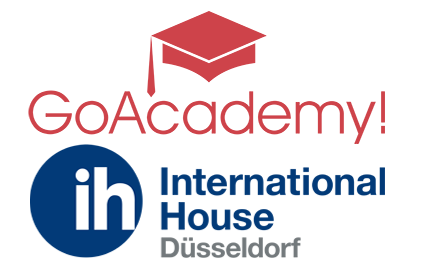Test German as a Foreign Language
TestDaF Exam in Düsseldorf
TestDaF Test Center Düsseldorf
We are licensed TestDaF examination center, so you can take the TestDaF exam directly at out language institute.
Free German Placement Test
You don't know your German level yet? No Problem, you can take our free placement test here: Online-Test
TestDaF Preparation and Exam
We offer TestDaF preparation courses in various types as well as exams.
Qualified TestDaF trainers
Our TestDaF trainers are only qualified German native speakers.
TestDaf for Foreign Students
Our TestDaF preparation courses are specially designed for foreign students planning to study at a German university.
Accommodation for Students
We offer different types of accommodation for our international students.
LICENSED TESTDAF EXAMINATION CENTER
TESTDAF EXAM
About the TestDaF Exam
TestDaF is the abbreviation for "Test German as a Foreign Language". TestDaF is a language admissions exam to prove the ability to study at German universities.
The development and organization of the TestDaF exams are subject to the TestDaF Institute.
The TestDaF exam is conducted before starting your studies at the respective university. The result of the TestDaF is given in three levels - TDN3, TDN4 and TDN5, which correspond to the GeR competence levels B2, B2-C1 and C1.
GoAcademy! Licensed TestDaF Preparation and Examination Center
As an official TestDaF exam center we prepare you optimally for the exam and ensure you a place to take the exam in our TestDaF test center.
Our TestDaF preparation courses are specially designed for foreign applicants who wish to receive specific language training for their studies at a German university.
TestDaF exam courses effectively prepare you for the German language test TestDaF by focusing on subject-specific exam situations as well as everyday life situations and teaching language skills in the four skills listening, speaking, reading and writing.
TestDaF Exam Format
The TestDaF exam consists of a total of four subareas. In all TestDaF exam parts, it should be determined whether you have the necessary knowledge of German to study in Germany.
Listening and reading comprehension of general and scientific topics are just as required as written and oral expressiveness.
However, to pass the TestDaF exam successfully, no special skills are required. The four sections of the TestDaF:
- Reading Comprehension
- Listening Comprehension
- Written Production
- Oral Production
TestDaF Exam 2025
TestDaF Digital Exam Dates 2025 | ||
| Exam Date | Preparation Course | Registration Deadline |
| 06.02.2025 | Do. 30.01.+Sa. 01.02.2025 | 24.01.2025 |
| 26.03.2025 | Do. 20.03.+Sa.22.03.2025 | 13.03.2025 |
| 03.06.2025 | Do. 22.05.+Sa. 24.05.2025 | 23.05.2025 |
| 18.09.2025 | Do. 11.09.+Sa. 13.09.2025 | 08.09.2025 |
| 30.10.2025 | Do. 06.11.+Sa. 08.11.2025 | 30.10.2025 |
Registration via official TestDaF website: www.testdaf.de
Exam: 210 €
Online preparation course optional: 85€
Details about
TestDaF Levels
TDN3 TestDaF Reading Comprehension
Can understand written texts from the study-related everyday life in their overall context and in essential details. Can understand texts on interdisciplinary scientific topics in parts.
TDN3 TestDaF Listening Comprehension
Can understand spoken texts from study-related everyday life in their overall context and in essential details. Can understand texts on interdisciplinary scientific topics in parts.
TDN3 TestDaF Written Production
Can express itself in comprehensible and coherent written form in everyday situations (eg report for scholarship providers). Can be expressed in a simplified way in the interdisciplinary scientific context (eg protocols, papers), linguistic and structural deficiencies can impair the comprehension of the text.
TDN3 TestDaF Oral Production
Can express oneself verbally in study-related everyday situations (eg enrollment, registration for the course), even if the understanding is partly delayed by linguistic deficiencies. Can realize the communicative intention in the interdisciplinary scientific context (eg socio-political discussions).
TDN4 TestDaF Reading Comprehension
Can understand written texts from everyday study life as well as texts on interdisciplinary scientific topics whose structure is based on the general language, in their overall context and in their details.
TDN4 TestDaF Listening Comprehension
Can spoken texts from study-related everyday life and texts on interdisciplinary scientific topics whose structure is based on the general language be understood in their essential statements.
TDN4 TestDaF Written Production
Can express itself in study-related everyday situations (eg report for grant recipients) as well as in interdisciplinary scientific context (eg protocols, papers) largely coherent and structured and largely appropriate, linguistic defects do not affect the understanding of the text.
TDN4 TestDaF Oral Expression
Able to comment verbally in study-related everyday situations (eg enrollment, registration for the course) as well as in interdisciplinary scientific contexts (eg socio-political discussions). Linguistic defects do not affect the communication.
TDN5 TestDaF Reading Comprehension
Can understand written texts from everyday study life as well as texts on interdisciplinary scientific topics that are structurally complex in terms of language and content, in their overall context and their details, and also take these texts from implicit information.
TDN5 TestDaF Listening comprehension
Can understand spoken texts from study-related everyday life as well as texts on interdisciplinary scientific topics that are complex in terms of language and content, in their overall context and their details.
TDN5 TestDaF Written Expression
Can express itself coherently and in a structured and linguistically appropriate and differentiated manner in study-related everyday situations (eg report for scholarship providers) as well as in the interdisciplinary scientific context (eg protocols, thesis papers).
TDN5 TestDaF Oral Expression
Can express himself or herself in situations relevant to the situation (eg enrollment, enrollment for the course) as well as in interdisciplinary scientific contexts (eg socio-political discussions) situation-appropriate as well as clearly and differentially verbally.
